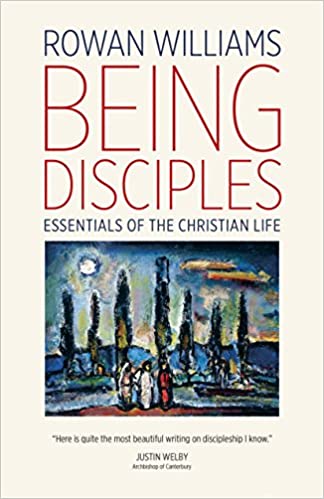The final chapter of Archbishop Rowan William’s book Being Disciples: Essentials of the Christian Life is about “Life in the Spirit.” This is the end goal of Christian discipleship – to live by the Spirit. Too often when we speak of a “life in the spirit” we envision a monk dedicating himself to prayer in a monastery or a Pentecostal speaking in tongues or maybe a particularly “great” or “moving” worship service. But, as Dr. Williams points out, spirituality doesn’t belong to a particular set of extraordinary Christians or extraordinary experiences. Spirituality also isn’t simply a part of our life or an aspect of our Christianity. Rather we are to be alive in the Spirit at all times and in all places. At the most basic everyday level, the spiritual person displays a life of love, joy, peace, patience, kindness, goodness, faithfulness, and self-control (Gal. 4:22-23). Spirituality isn’t a set of “spiritual activities” but refers to the type of human being we are to become and the virtues that we possess. Spiritual ecstasy is no substitute for ordinary kindness and practical generosity.
Dr. Williams writes that there are four dimensions to a Life in the Spirit: self-knowledge, stillness, growth, and joy. Self-knowledge is grounded in the ancient concept of apatheia. Apatheia (from where we get our concept of apathetic), is an escape from “suffering” or the “passions.” Originally, “to suffer” means to be affected by or subject to something beyond our control. When we look at the works of the flesh in Gal. 5:19-20 (licentiousness, enmity, strife, jealousy, anger, selfishness, envy, etc.), these works arise from the passions and the passions’ control over us. If someone strikes you on the right check, the passionate response is to hit him back. Therefore, the Christian understanding of self-knowledge or apatheia is the ability to take a step back and put distance between our feelings and our actions and reactions. Only when we are able to take this step back and look at the situation dispassionately are we then able to turn the other cheek.
The second dimension of Life in the Spirit is a stillness of body, mind, and heart. Be still and know that I am God, says the Psalmist. Ps. 46:10. On the banks of the Red Sea with Pharaoh’s army approaching the recently released Israelite slaves, God tells Moses, you only have to be still and I will fight for you. Ex. 14:14. And it is on God’s holy mountain, that Elijah discovers that God is not in the activity of the whirlwind, the power of the earthquake, or the intensity of the fire, but in the still small voice of silence. 1 Kings 19:12. I have attached chapter one “Inner Stillness” from Albert Rossi’s book Becoming a Healing Presence (which we read during Eastertide 2018). There he describes stillness as “an attitude of attentive alertness, or vigilance, and above all, of listening.” The Life of the Spirit is being quiet so that we can hear God and being still so that God can move through us.
The third dimension discussed by Dr. Williams is that of growth. “He who began a good work in you will bring it to completion at the day of Jesus Christ.” Phil 1:6. We are instructed to “grow in the grace and knowledge of our Lord and Savior Jesus Christ.” 1 Peter 3:18. Dr. Williams points out that growth requires being stretched and challenged, and not settling for our current situation. My goal for Tuesday night has always been to stretch and to challenge us.
The final dimension of our Life in the Spirit is joy. Joy not as a transient emotion, but as an abiding sense that we are connected to the Source of all Being. One of the great themes throughout the Scripture is that God’s people rejoice in God’s salvation. “You shall rejoice before the Lord your God . . . for shall remember that you were a slave in Egypt.” Deut. 16:11-12. “This is the Lord; we have waited for him; let us be glad and rejoice in his salvation.” Isa. 25:9. “We also rejoice in God through our Lord Jesus Christ, through whom we have now received our reconciliation.” Rom. 5:11. “Rejoice in the Lord always; again I will say, Rejoice!” Phil. 4:4. We rejoice in God’s salvation because it is God who first rejoiced in us. Luke 15.
Now to him who by the power at work within us is able to accomplish abundantly far more than all we can ask or imagine, 21 to him be glory in the church and in Christ Jesus to all generations, forever and ever. Amen. Ephesians 3:20-21

